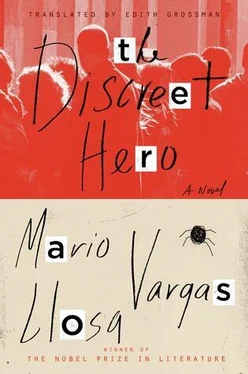They’d finished off the meal with a dessert of Chinese apples but were still drinking; Lituma’s head was a soft, agreeable whirlpool. Everything was spinning and from time to time he yawned uncontrollably, almost dislocating his jaw. Suddenly, in a kind of semi-lucid doze, he realized that Mono had started to talk about Felícito Yanaqué. He was asking him something. He felt his drunkenness beginning to evaporate and regained control of his consciousness.
“What’s happening with poor Don Felícito, cousin?” Mono repeated. “You must know something. Is he still determined not to make the payments they’re demanding? Miguelito and Tiburcio are very worried, this mess has really fucked the two of them up. He may have been really hard on them, but they love their old man. They’re afraid the crooks will kill him.”
“You know Don Felícito’s sons?” Lituma asked.
“Didn’t José tell you?” Mono replied. “We’ve known them for a while.”
“They’d bring the vehicles from Narihualá Transport to the shop for repairs and tuning.” José seemed annoyed at Mono’s confidences. “They’re both nice guys. We’re not good friends. Just acquaintances.”
“We’ve done a lot of gambling with them,” Mono added. “Tiburcio’s damn good at dice.”
“Tell me more about them,” Lituma insisted. “I only saw them a couple of times when they came to the station to make their statements.”
“Very good people,” Mono declared. “They’re very upset over what’s happening to their father. Even though the old man was really a tyrant with them, it seems. He made them do everything in the business, beginning from the very bottom. He still has them working as drivers, supposedly paying them what the others make. No preferential treatment even though they’re his sons. He doesn’t pay them a penny more, and doesn’t give them more time off. You probably know he put Miguelito in the army, supposedly to straighten him out, because he stepped off the straight and narrow. What a tough old bird!”
“Don Felícito is one of those rare types who appear only once in a while in this life,” declared Lituma. “The most upstanding man I’ve known. Any other businessman would be making his payments by now and have gotten this nightmare off his back.”
“Well, whatever, Miguelito and Tiburcio will inherit Narihualá and won’t be poor anymore.” José tried to change the subject. “And how are you doing, cousin? I mean, with women, for example. Do you have a wife, a girlfriend, girlfriends? Or just whores?”
“Don’t go too far, José,” Mono said, gesticulating, exaggerating the way he used to. “Look how you’ve embarrassed our cousin with that evil-minded curiosity of yours.”
“You don’t still miss the girl Josefino turned into a whore, cousin?” José asked with a laugh. “They called her Jungle Girl, didn’t they?”
“I don’t even remember her now,” Lituma said, looking at the ceiling.
“Hey, don’t remind our cousin of sad things, José.”
“Let’s talk about Don Felícito instead,” Lituma suggested. “Really, he’s got character; he’s got balls. He’s impressed me.”
“Who hasn’t he impressed — he’s the hero of Piura, almost as famous as Admiral Grau,” said Mono. “Maybe, now that he’s become so popular, the gangsters won’t dare to hurt him.”
“Just the opposite, they’ll try to hurt him precisely because of how famous he is; he’s made them look ridiculous and they can’t allow that,” declared José. “The gangsters’ honor is at stake, brother. If Don Felícito gets away with it, all the businessmen who pay extortion will stop tomorrow and the gang will break apart. Do you think they’ll put up with that?”
Had his cousin José become nervous? Lituma, between yawns, noticed that José had started to make lines again on the surface of the table with the tip of his nail. He didn’t stare, to avoid fooling himself the way he had the other day when he thought he was drawing spiders.
“And why don’t you people do something, cousin?” Mono protested. “The Civil Guard, I mean. Don’t take offense, Lituma, but the police, here in Piura at least, are useless. They don’t do anything; they only take bribes.”
“Not just in Piura,” said Lituma, following his lead. “We’re useless all over Peru, cousin. But let me tell you that I, at least, in all the years I’ve been wearing this uniform, have never asked anybody for a single bribe. And that’s why I’m poorer than a beggar. But with Don Felícito, the truth is that the case isn’t moving forward because we’re very short on technology. The handwriting expert who was supposed to help us is on leave because they operated on his hemorrhoids. Imagine, the whole investigation held up because of one gentleman’s damaged ass.”
“Do you mean you still don’t have clues about the crooks?” insisted Mono. Lituma would have sworn that José was begging his brother with his eyes not to keep harping on the same subject.
“We have some clues, but nothing very certain,” the sergeant answered. “But sooner or later they’ll make a false move. The problem is that now, in Piura, it’s not one gang operating but several. But they’ll fall. They always do something wrong and end up giving themselves away. Unfortunately, so far they haven’t made any mistakes.”
He asked them again about Tiburcio and Miguelito, the trucker’s sons, and again he thought that José didn’t like the subject. At a certain point the brothers contradicted each other.
“We actually haven’t known them for very long,” José repeated from time to time.
“What do you mean not very long, it’s been six years at least,” Mono corrected him. “Don’t you remember the time when Tiburcio drove us to Chiclayo in one of his trucks? How long ago was that? A long time. When we tried to go into that business but it didn’t work out.”
“What business was that, cousin?”
“Selling agricultural machinery to the communities and cooperatives in the north,” said José. “The bastards never paid. They protested every bill of exchange. We lost almost everything we’d invested.”
Lituma didn’t insist. That night, after saying goodbye to Mono and José, thanking them for the meal, taking a jitney to his boardinghouse, and getting into bed, he lay awake for a long time thinking about his cousins. Especially José. Why did he have so many doubts about him? Was it just because he drew with his fingernail on the table? Or was there really something suspicious in his behavior? He’d started acting strangely, as if he were worried, every time Don Felícito’s sons came up. Or was this nothing but his own qualms about how lost the investigation was? Should he tell Captain Silva about his misgivings? Better to wait until it was all less insubstantial and something took shape.
But the first thing he did the next morning was to tell his boss everything. Captain Silva listened attentively, not interrupting him, taking notes in a tiny notebook with a pencil so small it disappeared between his fingers. When Lituma had finished, the captain murmured, “I don’t think there’s anything serious here. No clue to follow, Lituma. Your León cousins seem clean.” But he sat there brooding, silent, chewing on his pencil as if it were a cigarette. Suddenly, he made a decision. “You know what, Lituma? Let’s talk to Don Felícito’s sons again. From what you’ve told me, it seems we still haven’t gotten all the juice from those two. We’ll have to squeeze a little harder. Make an appointment with them for tomorrow, each one separately, of course.”
At that moment the guard at the entrance knocked on the cubicle door and his young, beardless face appeared in the opening: Señor Felícito Yanaqué was on the phone for the captain. It was extremely urgent. Lituma watched the chief pick up the old telephone receiver, heard him murmur, “Good morning, sir.” And he saw his face light up as if he’d just been told he’d won the lottery. “We’ll be right there,” he shouted and hung up.
Читать дальше

![Гарри Гаррисон - Bill, the Galactic Hero [= The Starsloggers]](/books/87536/garri-garrison-bill-the-galactic-hero-the-star-thumb.webp)










